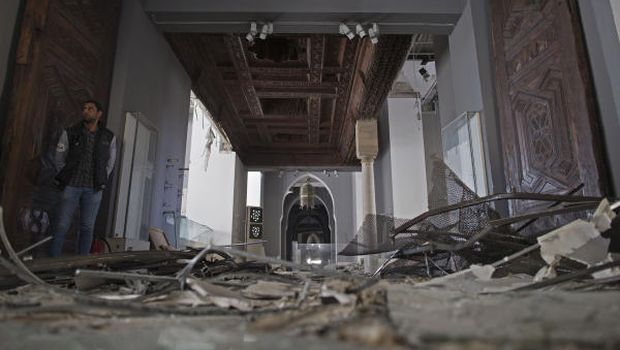It is hysterically paradoxical that the so-called Ansar Bait Al-Maqdis (Defenders of Jerusalem) have proudly claimed responsibility for an explosion that destroyed the world’s most significant museum of Islamic art in Egypt. Despite the significance and the implications of its name, the group does not see a fundamental difference between destroying gas pipelines in the Sinai Peninsula and priceless Islamic treasures in Cairo. This mad orgy of bombings boils down to a fierce, systematic campaign of destroying archaeological sites in the Arab world, absurdly accompanied by a robust call to return to “roots” and “authenticity.” The Arab revolutions calling for dignity and freedom may reach a humiliating and shameful end thanks to greed and terrorism.
Arabs have been smarting about Israel’s war of elimination and attempts to distort history over the past 65 years in Palestine. They formed committees and raised donations but failed to rescue the Al-Aqsa Mosque from sabotage. Instead of saving Palestine, Arabs found themselves witnessing the destruction of central Beirut and the stripping of Iraq’s most precious asset—its history.
Mesopotamia, the cradle of early civilizations and the land of Babylon, Sumer, Akkad and Assyria, has been rendered soulless. Who sought to uproot Iraqis from their history and drive them to murdering one other? We have recently discovered that the Allied forces enjoyed setting up military barracks in Iraq’s most significant and famous historical sites, such as the great Sumerian city of Ur. Tanks and armored vehicles rolled up and down the royal graves of Ur and on the site of the Hanging Gardens of Babylon, one of the seven wonders of the ancient world.
Reports indicate that 15,000 historical sites in Iraq have been looted and vandalized and a similar number of artifacts stolen from the Iraqi Museum following the US invasion in 2003, prompting archeologists to describe the loss as the greatest theft in history.
Some found it reassuring to lay the blame on the US, which certainly holds responsibility for what happened. However, far worse is what Arabs themselves have committed against their own historical heritage.
Neither Aleppo’s charming old souks, nor its marvelous Umayyad Mosque, nor the Maarrat Al-Nu’man ruins or the historical treasures of Palmyra have been spared from destruction.
Entire Byzantine and Roman cities in Syria are being destroyed as suspicious silence also prevails over what is happening in Yemen and Libya.
There is an unquenchable thirst for severing ties with the past, for blotting out memories, and erasing any sign of nations coexisting harmoniously on these lands. At times of religious segregation, fraternal infighting and cultural fragmentation, testimonies to the tolerance and reconciliation of ancient civilizations become a heavy burden on the intolerant.
Preachers do not hesitate to issue fatwas allowing the sale or the disfiguring of human-shaped statues, in a bid to get rid of a phenomenon which has never really been a source of worry for Muslims over the past 1,400 years. Those preachers believe they have the right to determine the fate of historical heritage which does not only concern Egypt, but is part of our collective human memory.
Upon invading Egypt, Omar Ibn Al-Khattab, the second Muslim caliph, did not order the destruction of the country’s Pharaonic or Roman heritage, nor did he commit acts of revenge on their temples. Neither did the Muslim army commander Amr Ibn Al-‘As deface artefacts when he entered the country. It was not until the neo-Mujtahids came along that the sight of museums and bookshops became intolerable.
Now, a new attack is launched on Egyptian archaeological sites as security deteriorates further. When the January 25 Revolution erupted, it was the turn of the Egyptian museum. Amid the chaos that accompanied the removal of the Islamist President Mohamed Mursi, the Malawi museum in Minya was next, receiving its own share of destruction, with around 1,000 artefacts reported destroyed and as many stolen.
The truth is that violence emanates from the fragility of Arab identity and the foggy understanding of the concept of belonging. Further destruction of our ancient cities, souks and heritage means stripping us of the remains of an already damaged memory that will leave us exposed in vacuum.
The hysterical orgy of murder has only just begun. Downplaying the importance of the material compared to the human loss will eventually cost us both. At that time will appear those who accept nothing less than the torching of mummies and the decapitation of the Great Sphinx of Giza.
